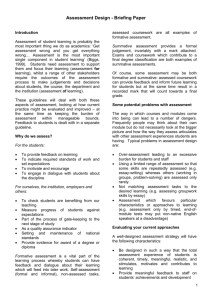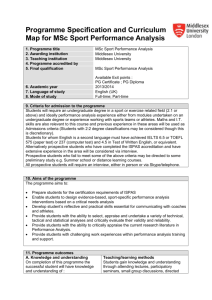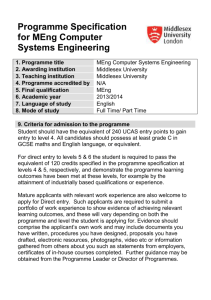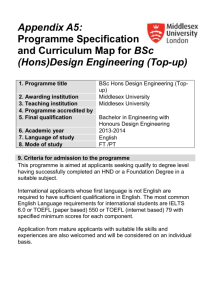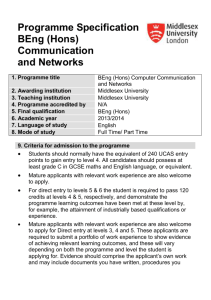Computer Networks (Mobile Comp) - BSc
advertisement
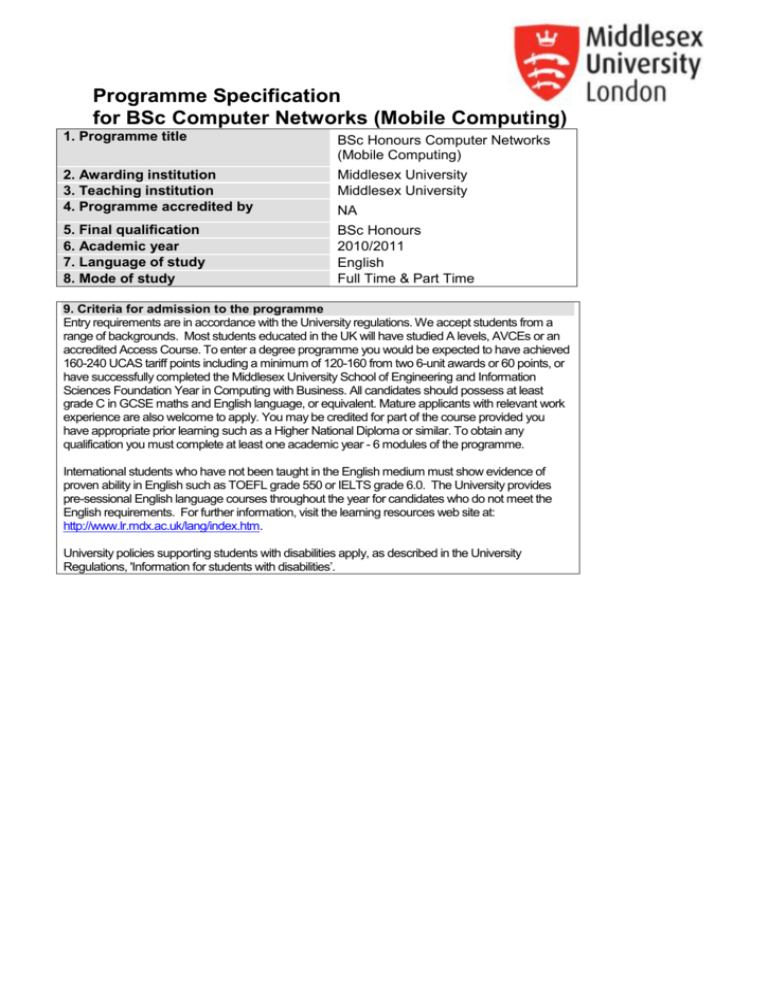
Programme Specification for BSc Computer Networks (Mobile Computing) 1. Programme title BSc Honours Computer Networks (Mobile Computing) 2. Awarding institution 3. Teaching institution 4. Programme accredited by Middlesex University Middlesex University 5. Final qualification 6. Academic year 7. Language of study 8. Mode of study BSc Honours 2010/2011 English Full Time & Part Time NA 9. Criteria for admission to the programme Entry requirements are in accordance with the University regulations. We accept students from a range of backgrounds. Most students educated in the UK will have studied A levels, AVCEs or an accredited Access Course. To enter a degree programme you would be expected to have achieved 160-240 UCAS tariff points including a minimum of 120-160 from two 6-unit awards or 60 points, or have successfully completed the Middlesex University School of Engineering and Information Sciences Foundation Year in Computing with Business. All candidates should possess at least grade C in GCSE maths and English language, or equivalent. Mature applicants with relevant work experience are also welcome to apply. You may be credited for part of the course provided you have appropriate prior learning such as a Higher National Diploma or similar. To obtain any qualification you must complete at least one academic year - 6 modules of the programme. International students who have not been taught in the English medium must show evidence of proven ability in English such as TOEFL grade 550 or IELTS grade 6.0. The University provides pre-sessional English language courses throughout the year for candidates who do not meet the English requirements. For further information, visit the learning resources web site at: http://www.lr.mdx.ac.uk/lang/index.htm. University policies supporting students with disabilities apply, as described in the University Regulations, 'Information for students with disabilities’. 10. Aims of the programme Computer networks are strategically important in creating a safer, more productive and intelligible environment by allowing data to be transmitted securely over potentially vast distances at high speed. Business competitiveness, and modern personal and organisational communications are critically dependent on the performance of well-designed network systems. This new programme allows you to develop a wide range of networking abilities highly valued and sought-after by the international network sector. These abilities include creation of networks that meet given needs and purposes, and configuration of a variety of networks for secure operation; you will come to understand the fundamentals of data communications theory and practice. Wherever appropriate modern laboratories equipped by industry-standard equipment and development tools will support the development of your abilities. The primary educational aim is to produce graduates fully prepared for a range of careers in networking technology, network deployment and the development of mobile computing systems and services. The programme has been designed to enable you to progress to postgraduate study in computer networks and mobile computing. Graduates will possess an understanding of fundamental aspects of current networked systems and appreciate the significance of new and emergent developments within the area and the professional standards required of a network practitioner. This programme will enable you to design, implement, operate, manage, configure a range of networks based on the latest technology and be sensitive to vital network security needs. In particular, you will be able to develop specialist software-based mobile Internet applications and services, and appreciate security and technological issues affecting the use of wireless local area networks and understand a range of measures that mitigate security vulnerabilities. 11. Programme outcomes A. Knowledge and understanding On completion of this programme the successful student will have knowledge and understanding of : 1. Deploy the mathematics, scientific and data communication theory relevant to the efficient, secure transmission and storage of data in the analysis and solution of computer network problems, network design and the simulation of systems designed; Teaching/learning methods Students gain knowledge understanding through The curriculum has been expressly designed to offer the opportunity of academic progression between levels of study within identifiable computer network and related themes supported by this programme. 2. Specify, plan, adapt, construct and test a range of networks taking into account current network, wireless and Internet standards, models, protocols, functional and operational characteristics of Internet and network infrastructure, criteria of network and network component quality; At Level 1, modules address the conceptual, technical and mathematical underpinnings of the study of computer networks. A1 and A2 is introduced in contexts relating to networks and computer communication by means of lectures, seminars and laboratories; students will be helped to understand the relevance to the development and analysis of networks systems and network applications. Set tasks will be used to engender confidence and proficiency within the particular topics addressed. Elements of A5 are addressed, but not explicitly assessed at this level. 3. Critically evaluate system feasibility, sustainability and compliance with current and future needs by taking into account the main relevant economic, ethical, social, legal and environmental facts, principles and issues; 4. Plan, conduct and report a significant mobile computing and services project using appropriate project management principles and techniques; 5. Apply a range of modelling techniques and semiformal and formal notations as appropriate to clarify, evaluate and communicate computer network or mobile computing design concepts effectively; 6. Critically evaluate computer network and mobile computing systems feasibility, sustainability and compliance with current and future needs by taking into account the main relevant economic, ethical, social, legal and environmental facts, principles and issues. and Elements of A3, A4 and A6 are addressed implicitly to motivate initial understanding and to place technical topics into a wider context. Learning materials deliberately relate to computers and networks. Wherever timetabled session case studies or problems concerning networks or applications at system level are addressed, additional learner support is offered by tutors. Problem solving, and design tasks are used in seminars to reinforce and deepen understanding and students are given the opportunity of practically applying theory in network laboratory tasks and seminars. At Level 1, there is significant horizontal integration of learning materials; for example networking concepts and terminology are introduced in one module and in another simple yet real life scenarios are used to deepen and refine understanding by engaging students in practical application at topic level. At Level 2, further material addressing A1, A2 and A5 is introduced by lectures, seminars and often applied using laboratory-based tasks. Topics introduced typically involve an increasingly systems level content and networks. Wherever timetabled sessions address case studies or problems concerning networks or applications at system-level, additional learner support is offered by tutors. Problem solving, and design, problem solving and analysis skills expected as measured by the demands applying theory in practical network laboratory seminars. Progressively increasing levels of appreciation and determination of quality and performance aspects of products, processes and small-scale systems is encouraged and expected in coursework, seminarbased work. At Level 3, students are expected to consolidate their understanding of new material supporting each of A1, A2 and A5 and to take greater responsibility for the selection and choice of concepts, principles and methodology needed to analyse, synthesise and evaluate particular systems, processes and products in a range of contexts relevant to the programme’s core focus and content. Individual project work addresses A4 in which student learning will include an appreciation of the open-ended ness and incompleteness of knowledge in practical computer communications problems at system level. This work is supported by regular and frequent formative feedback from the supervisor. In general, learning and teaching materials acknowledge the diverse cultural background of students on this programme and are intended to permit equality of access. Assessment Method Outcomes A1, A2, A5 are assessed using coursework assignments involving a range of problem-solving, design, analysis, modelling and simulation tasks individual and group work (including presentations and formal reports of work undertaken) increasingly framed at system level, through the programme multiple questions, presentations of work-inprogress, and unseen written examinations at Levels 2 and 3. choice Outcomes A3, A4 and A6 are not explicitly assessed at Level 1. Typically a module will involve a variety of assessment types to target students’ differing learning styles. Written formative feedback is given on return of course work and formative feedback is given within seminars and laboratories. B. Cognitive (thinking) skills On completion of this programme the successful student will be able to: 1. Select, configure, and operate the principal components of Internet and network infrastructure and tools, safely and effectively; 2. Implement algorithms in software and develop a range of Internet and network software communication applications; 3. Use a range of development tools and equipment for the construction and test of mobile applications and services. 4. Develop and evaluate a range of distributed and mobile applications and services for personal, organisational or commercial use. Formative feedback is provided on student performance in end of year unseen written examinations in the form of generic formal examiners reports. A4 is assessed by coursework, final project report, and viva/ demonstration as appropriate Teaching/learning methods Students learn cognitive skills Through A variety of digital, wireless, network, computer and soft ware laboratories provide environ ments and tools for system design, simulation, and test are used to foster the development of practical skills B1-B4 through a range of laboratory and/or seminar-based task typically relying on learning-inaction. Supportive environments allow the development of B1-B4; formative feedback on performance of B1-B4 development is offered by tutors within laboratories and seminars prior to assessment, and then more formal feedback is offered. At Level 1 students are taught how to operate specialist equipment effectively and safely and to respect rules of conduct in laboratories. Assessment Method Student’s practical skills are typically summatively assessed by combinations of practical assignments, group and individual presentations, laboratory exercises, production of design documentation and specific demonstration of work and unseen written examination. Formative feedback is given with returned assessed course work; generic feedback on examination performance is given in the form of an Examiners Examination Report. C. Practical skills On completion of the programme the successful student will be able to: 1. Work effectively both autonomously in independent project-oriented activity, and cooperatively as a member of a group or projectteam and manage time and other resources; 2. Apply mathematical skills and understanding to tasks requiring modelling, system analysis and problem-solving; 3. Learn effectively for life-long personal and career development and to reflect on progress of learning; 4. Communicate effectively and explain technical information, concepts, arguments, design information effectively, using a variety of media, and range of methods appropriate to a given type of audience or communication objective; Conduct research effectively, drawing on a wide variety of sources (including libraries, the Internet and electronic catalogues) under minimal direction, and be proficient in the accurate referencing of sources of information Teaching/learning methods At Level 1, students become involved in many different activities requiring the exercise of C1-C5 whose development is supported by regular and frequent formative feedback on assessed and non-assessed work in laboratories and seminars The development of transferable skills C4and C5 is progressed at Level 2 in the contexts of group project work and at level 3 in that of individual project work. Assessment Method Students’ practical skills are assessed by A variety of assessment types are typically used for each of the intended transferable skills outcomes. These include seminar-based assessment, multiple-choice questions and coursework, laboratory tasks taking place in learning environments including specialist develop ment tools or equipment, as appropriate, group and individual projects, and mini projects. Reports reflecting research under taken at all levels of study are assessed and formative feedback provided. Individual and group project research presentations are assessed. Skills outcomes C1-C5 are designed to reflect the University’s Graduate Skills requirements. These skills are taught, and asse ssed at Level 1, and skills develop ment allows students the opportunity of contributing to their Personal Development Portfolios (PDPs). 12.2 Levels and modules Starting in academic year 2010/11 the University is changing the way it references modules to state the level of study in which these are delivered. This is to comply with the national Framework for Higher Education Qualifications. This implementation will be a gradual process whilst records are updated. Therefore the old coding is bracketed below. Level 4 (1) COMPULSORY OPTIONAL Students must take all of the following: CCM1418 Introduction to Operating Systems, Computer Architectures and Networks Students must also choose at least XX from the following: PROGRESSION REQUIREMENTS Students must pass 120 credit points to progress to level two fulltime study or level two part-time study CCM1412 Fundamentals of Computing CCM1416 Computer Networks CMT1314 Programming with Data Structures and Algorithms Level 5 (2) COMPULSORY OPTIONAL Students must take all of the following: Students must also choose at least XX from the following: PROGRESSION REQUIREMENTS Students must pass at least 180 credit points (including 60 at level 2) in order to be eligible to enrol on modules at level 3, and at least 210 credits (including 90 at level 2) in order to be eligible to enrol on the level 3 Computer Communications project module. CCM2426 Professional Project Development and Management CCM2420 Data Communications CCM2412 Network Routing and Protocols CCM2414 Wireless LANs and Mobile Computing Level 6 (3) COMPULSORY OPTIONAL PROGRESSION REQUIREMENTS Students must take all of the following: CCM3422 Computer Communications Project CCM3415 Advanced Network Security and Design CCM3413 Mobile Internet Applications and Services CCM3411 Distributed Systems Students must also choose at least XX from the following: In order to graduate with an honours degree i.e. a BSc Hons Computer Networks (Mobile Computing) award, students must have achieved 360 credit points, or to graduate with an ordinary degree, 300 credit points with a minimum of 60 credit points at Level 3 12.3 Non-compensatable modules (note statement in 12.2 regarding FHEQ levels) Module level Module code Level 6(3) CCM3422 (Computer Communications Project module)


